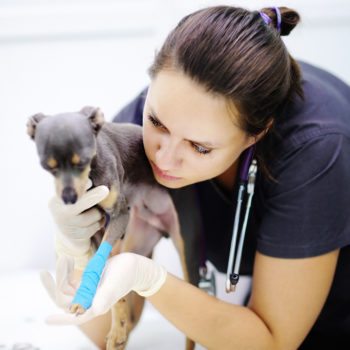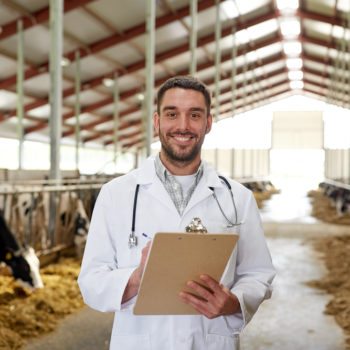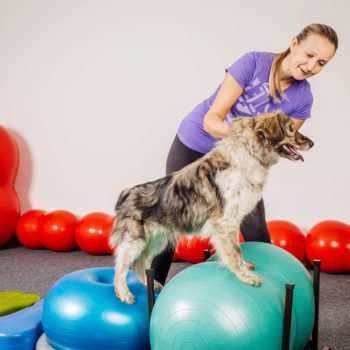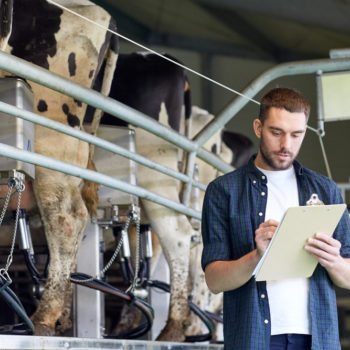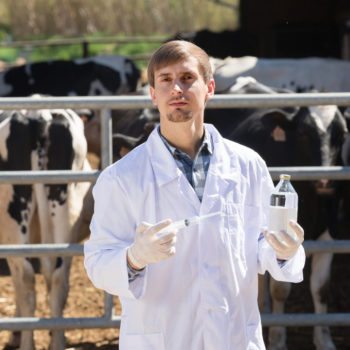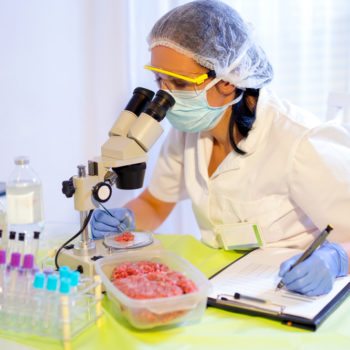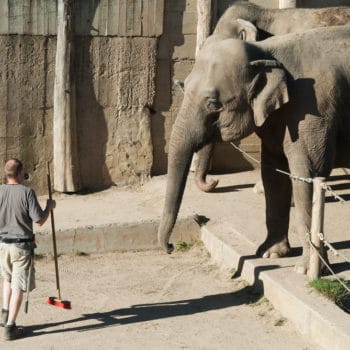Why We Love It
-
$44,650Potential Avg. Salary*
* Salary & growth data is based on the recent Bureau of Labor and Statistics data published at https://www.bls.gov/oes/current/oes452021.htm for 45-2021 Animal breeders 11/2021. Based on national data, not school-specific information. Conditions in your area may vary.
With a bachelor of science in animal sciences, you’ll gain the education needed for a successful career working with and studying animals.
Students learn how to breed, care for, and research animals, study animal reproduction systems, disease control, and pet and livestock marketing. Many animal science majors also continue their educations, attending veterinarian school after graduation.
What is a Degree in Animal Science?
In an animal science bachelor’s degree program, you’ll have the opportunity to choose a focus of your studies that will stem from the career you aspire to move into. For example, some animal studies majors concentrate on pre-veterinary studies and follow curriculums that prepare graduates for success in graduate veterinary school.
Others focus on animal management and learn how to care for, utilize, and market livestock that’s raised on both large and small farms and ranches across the country.
Graduates from animal science programs gain a detailed knowledge of animal biology and physiology, and this helps them understand how to best work and care for a variety of animals.
You may go on to work for zoos, ranches, farms, pet stores, and animal training facilities, or you may work in animal sales and focus your efforts on breeding and selling marketable pets and livestock. Some also continue their education to work in biotechnology research, studying animal genetics to develop quality breeds.
Recommended Schools
What Courses Would I Take For a Major in Animal Science?
- Animal Management
- Animal Cell & Molecular Biology
- Animal Anatomy & Physiology
- Animal Genetics
- Farm Animal Care & Welfare
- Wildlife Reproduction
- Basic Animal Nutrition & Feeding
- Animal Diseases
What Jobs Can You Get with a Degree in Animal Science?
An animal sciences degree prepares you for success in a wide variety of roles, so the job outlook for graduates of these programs is positive. Increased awareness of the importance of providing healthy and happy living conditions for pets and livestock has also increased demand for individuals who are qualified to care for animals.
Additionally, more people now keep pets in their homes, so more veterinarians will be needed to provide healthy living and urgent care for sick and well pets.
How Long does it take?
A bachelors in Animal Science will have a typical length of 4 years in a full time schedule. That said, there are many ways to speed up the timeframe by either taking more units via online coursework, community college, or taking free classes at OnlineDegree.com that could transfer to universities in the US.
Online Animal Science Degree
Animal science is relatively less popular than other programs like veterinary science, but it is also more affordable and easier to complete. It is difficult however to find animal science programs that are offered completely online, as a significant part of the study depends on practical experience.
Accordingly, a good choice for a bachelor degree in animal science is the hybrid mode of education where theoretical courses are offered online while practical courses are offered on campus since labs and clinical work are an essential part.
What Can You Do With an Animal Science Degree?
Animal science is a field of study that is concerned with the breeding, care and production of farm animals and products. It is closely related to other fields as veterinary and food science. Animal science aims at fulfilling the demand for food with the massive growth in the world population, in addition to improving the quality of food available.
Accordingly, most animal science degree programs previously focused on livestock species such as cattle, sheep, pigs, poultry, and horses. Recently, programs started to focus on a broader range of animals including pets such as cats and dogs. Studying animal science can also be a supporting step toward earning a degree in veterinary science.
What does an animal science student learn?
Studying animal science requires a good understanding of biology as a fundamental course. Additionally, the students learn about the breading methods and the development of new strains on various farm products.
The following courses are commonly offered:
- Animal nutrition: this course introduces the diet of animals with more focus on farm animals but it may also include animals in the zoo and wildlife. Animal nutrition can be classified into 7 main types of nutrients: carbohydrates, proteins, fats, fibers, minerals, vitamins and water.
- Research methods and statistics: the course introduces the main tools used in animal science studies.
- Elements of livestock production: the course presents the main elements required for livestock production which include ensuring the quality of foodstuffs, housing optimization, environmental conditions, health and hygiene standards and market understanding.
- Animal genetics: the students learn about how animal pass their traits from one generation to another. Selective breeding is a common process in food production to get more healthy strains or increase productivity.
- Animal physiology and diseases: this course introduces the normal functioning of animal bodies and tissues and how they are affected by the most common diseases. It provides the students with the basic knowledge for the management of some health conditions.
- Equine production: there is particular care for horses compared to other types of farm animals. They may also need special training if these horses are intended for racing. The value of some horses has reached tens of millions of dollars.
- Agribusiness principles: this course introduces the management principles of the business. It is important for students who are planning to start their own business.
Now I have the animal science degree…where can I work after graduating?
Farming and animal breeding are the oldest craft practiced by humans. There is always high demand for this degree as an essential profession for humans with a value estimated to be around $1.77 trillion in 2019. The following list shows the common career options for animal science graduates:
- Food inspector: this job is needed at governmental and non-governmental organizations whose role is to monitor the quality of food.
- Animal sales and marketing: the role of this job is to market food products either as living animals or processed food.
- Embryo transfer technician: this job is the main role in the areas of in vitro fertilization, cloning and transgenic animal production.
- Horse farm trainer and manager
- Meat, milk and food quality testing
- Veterinary technician: this may be a preferred career choice if you are planning to complete a veterinary degree for the future.
- Zoo animal specialist
- Research farm manager
Should I choose an animal science degree?
Are you interested in working with animals? An animal science degree will open a large number of opportunities in this profitable industry. You should consider having a number of skills to ensure your success in this field:
- Time management: farming and animal breeding can be demanding and stressful.
- Dedication and motivation to work: animals require careful attention and care to provide good results.
- Staying up-to-date: the food industry develops and changes quickly with the introduction of new formulations, animal strains and genetically modified food products.
Recommended Schools
Best Jobs for Animal Science Degrees
The advantage of a bachelor’s degree animal science is its flexibility. You can work with animals at pet stores, training facilities, zoos, shelters, and pet daycares, or you care for livestock or horses on farms and ranches.
Additionally, you may be able to continue your education to work as a veterinarian or to work in animal reproduction and genetic research. You may also find work advocating for animal rights.
How to save time and money
Our mission is to help you to avoid paying full price for college. We want your Animal Science degree to be affordable and accessible. Here’s how you could save:
Create Your Free SmartPlan

There are many ways to make college affordable and accessible.
That’s why we created a helpful tool called SmartPlan.
It’s free, and helps you find potential ways to save and tons of information about each school you’re considering
Think of it as your “college blueprint”, to help you instantly craft a path to your degree:
- Which Colleges Match Your Needs
- Ways You Could Save Time & Money
- Free Courses You Could Take for Credit
- Valuable Data and Insights on Each College
- Detailed Steps You Should Take!
See what’s possible for you and generate a free plan within just a few minutes
Create My SmartPlanYou Might also be Interested in
Many visitors who look for a degree in Animal Science are also interested in the following degrees.


